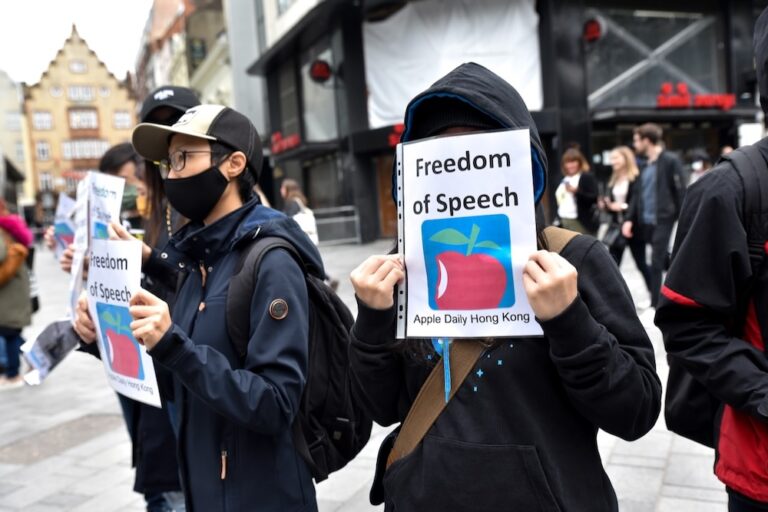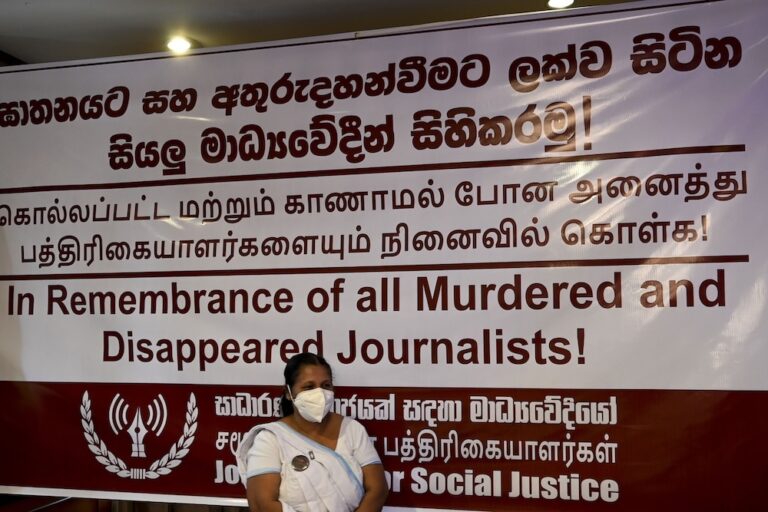(Freedom House/IFEX) – Freedom House reports that the numbers noted in the previous alert have changed. Freedom House regrets the error. The following is the corrected text of the press release: GLOBAL PRESS FREEDOM IMPROVES; OPENINGS IN PERU, YUGOSLAVIA SPUR GAINS Annual Freedom House Report Includes Surprising Assessment of Internet Freedom NEW YORK, April 30, […]
(Freedom House/IFEX) – Freedom House reports that the numbers noted in the previous alert have changed. Freedom House regrets the error. The following is the corrected text of the press release:
GLOBAL PRESS FREEDOM IMPROVES; OPENINGS IN PERU, YUGOSLAVIA SPUR GAINS
Annual Freedom House Report Includes Surprising Assessment of Internet Freedom
NEW YORK, April 30, 2001 — In a major study released today, Freedom House finds that press freedom registered overall gains throughout the world in 2000. However, despite the positive trends reflected in the latest annual Survey of Press Freedom, freedom of expression was dealt a severe blow in a number of large and geopolitically important countries. The Survey also finds that Internet freedom exceeds levels of press freedom in most countries, including some closed societies governed by censorious regimes.
The entire report can be found online at www.freedomhouse.org/pfs2001/pfs2001.pdf
Most alarming are the recent, ominous developments in Russia, among them the forced takeover of the independent NTV television network, Sevodnya newspaper, and Itogi magazine by a state-dominated gas monopoly. The Survey — which reflects findings up to the end of 2000 — places Russia in the Partly Free category. But serious crackdowns on independent journalists and media outlets — especially those reporting on official corruption or the war in Chechnya — have resulted in a discernible regression in the state of Russian press freedom. Were Russia to be rated today, the Survey would place it in the Not Free category.
China also continues to harass and intimidate journalists, jail “cyber dissidents,” and fill the country’s airwaves with defamatory propaganda, directed at groups such as Falun Gong.
Out of 187 countries surveyed, 72 (38.5 percent, representing 21% of the world’s population) are considered Free, with no significant restrictions on the news media; 53 countries (28.3 percent, or 43% of the global population) are rated Partly Free and are characterized by some media restrictions; 62 countries (33.2 percent, or 36% of the world’s population) are rated Not Free, characterized by state control or other obstacles to a free press.
Internet Freedom
This year’s Survey includes the first-ever comparative survey on Internet freedom. Countries were rated “Least Restrictive,” “Moderately Restrictive,” and “Most Restrictive” based on their levels of Internet penetration, the regulatory environment, and cost of Internet access.
In the absence of adequate data from 55 nations, 131 countries were examined in the report, with 59 (46 percent) rated Least Restrictive, 53 states (40 percent) considered Moderately Restrictive, and 19 (14 percent) rated Most Restrictive.
Among the principal findings on Internet freedom:
– While a strong correlation was discovered between a free press and Least Restrictive use of the Internet, some of the most repressive and closed societies restrict content on the Internet “least” or “moderately.”
– Some major democracies (Australia, UK, US) where print and broadcast media are freest, nevertheless restrict freedom on the Internet, ostensibly to maintain state secrets or bar pornography.
– Countries with Internet access considered Most Restrictive generally allow only state-run Internet service providers to operate.
– For some states, especially China and some nations of the Middle East, the Internet poses an inherent dilemma: allow greater Internet use for commerce, or restrict its use to protect religious, cultural, or political values?
Bright Spots in 2000
In Yugoslavia, independent journalists played a crucial role in the overthrow of Slobodan Milosevic in October. Despite repeated prosecution, police raids, fines, and equipment confiscations, Yugoslav media, including several independent newspapers continued to publicize government corruption and human rights abuses, and widely covered mass anti-government demonstrations following rigged September elections, which led to Milosevic’s downfall.
In Peru, independent investigative print and radio journalists braved intimidation, death threats, surveillance, physical attacks and arbitrary prosecution while reporting on government and military corruption, human rights abuses, and President Fujimori’s electoral victory in a rigged April vote. Perseverance by the independent press eventually led to Fujimori’s fall from power in November after a TV news program aired footage of Fujimori’s intelligence chief bribing an opposition congressman.
Both countries moved from Not Free to Partly Free.
Press Freedom Regional Trends
Africa: 15 countries improved within their categories, while nine declined. Six countries are rated Free, 17 Partly Free, and 30 Not Free. Harassment, detention, beatings of journalists escalated in Cote d’Ivoire during the year in the midst of a political crisis.
Asia: Four countries improved within their categories, while seven declined. Seven countries are rated Free, 5 Partly Free, and 13 Free. In Indonesia, independent media were increasingly assertive in covering political issues and the deepening corruption scandal surrounding President Abdurrahman Wahid.
Western Europe: Five countries registered improvements within their categories, while four declined slightly. The region continued to register the highest number of Free countries, at 21. One is rated Partly Free (Turkey) and none is rated Not Free. Spanish journalists faced violent attacks, including murder, by Basque separatists during the year.
Latin America: Two countries registered significant improvements. With changes of governments, Peru changed from Partly Free to Free and Suriname from Not Free to Partly Free. Seven countries showed slight improvements in their categories. Eighteen of the region’s states are rated Free, 14 Partly Free, and 1 Not Free.
Middle East: No improvements in press freedoms were registered in the region. The Palestinian uprising took a toll on journalists, who suffered abuses and shootings by both Israeli and Palestinian security forces. Only one country, Israel, has Free media, while two, Jordan and Kuwait, have Partly Free media. The media in eleven states of the region are considered Not Free.
Eastern Europe and the NIS: In addition to the significant upgrade of Yugoslavia, six countries registered slight improvements in press freedom. But, nine countries registered declines, including Azerbaijan, which passed a new mass media law prohibiting broadly defined insults to “honor and dignity.” In addition to Russia, Ukraine displayed worrying signs of a sliding into the Not Free category, after President Leonid Kuchma became indirectly implicated in the disappearance and murder of independent Internet journalist Hryhoriy Gongadze. Of the 27 countries in the regions, nine are rated Free, eleven are Partly Free, and seven are Not Free.
Pacific: Three countries registered slight upgrades in 2000, including Fiji, whose media vigorously covered a severe political crisis, despite attacks by rebel forces. Four countries were downgraded slightly. Nine of the region’s countries are rated Free, with three considered Partly Free, and none Free.
North America: Both Canada and the United States are rated Free, although press freedoms declined slightly in both countries in 2000. American media mergers resulted in great corporate concentration and in Canada, two court decisions against media outlets and several attacks on journalists raised concerns.
The entire Survey of Press Freedom, containing country-by-country reports, essays on the state of Internet Freedom and press freedoms generally, and an interactive press freedom map, are available online at www.freedomhouse.org/pfs2001/pfs2001.pdf
Freedom House, a non-profit, non-partisan organization, monitors political rights and civil liberties worldwide. In addition to its annual Survey of Press Freedom, it also publishes Freedom in the World, an annual global survey measuring freedom in every country, and Nations in Transit, a comprehensive comparative survey of the post-Communist states of Eastern and Central Europe and the former Soviet Union.


